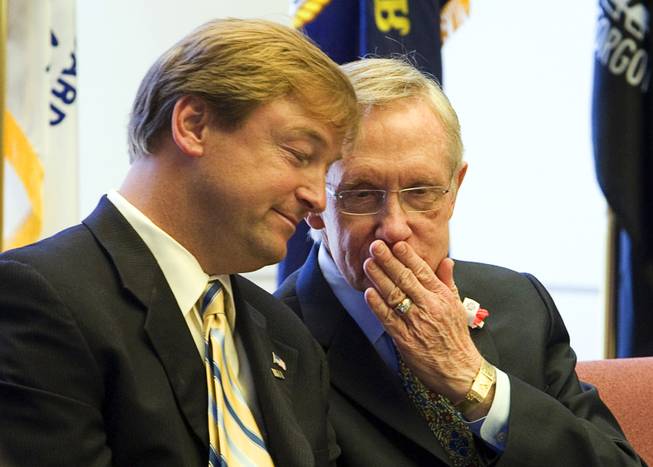
Sen. Harry Reid whispers to Sen. Dean Heller during a Memorial Day ceremony at the Southern Nevada Veterans Memorial Cemetery in Boulder City on Monday, May 30, 2011.
Wednesday, Aug. 31, 2011 | 2 a.m.
Georgiou on "Face to Face"
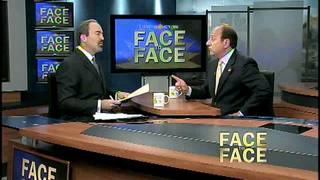
Viewing video requires the latest version of Adobe's Flash Player
Sun coverage
Sun coverage
- Georgiou abandons U.S. Senate bid, clears way for Berkley on Democratic ticket (8-10-2011)
- Georgiou blasts Reid, accuses him of ‘petty politics’ and ‘selective memory lapses’ (6-24-2011)
- Reid on Georgiou appointment to financial crisis commission: ‘I wish I hadn’t done it’ (6-21-2011)
- Harry Reid raises ethics concerns over economic report (6-20-2011)
- Financial woes trail Senate candidate who probed economic crash (6-16-11)
- Who is Byron Georgiou and why should he scare the Democratic establishment? (3-28-11)
- Financial crisis was avoidable, Las Vegan on inquiry panel says (1-28-11)
Senate Majority Leader Harry Reid is the highest-ranking elected official in Nevada history. He is also, without doubt, its most skilled politician.
Reid has achieved success without charisma, a gift for oratory or good looks. So how does he get what he wants?
Consider the fate of Byron Georgiou, a wealthy businessman who launched a campaign for U.S. Senate this year and learned the hard way not to defy Reid.
The two had been on good terms — Reid appointed Georgiou to the high-profile Financial Crisis Inquiry Commission, which examined the causes of the economic crisis. But the good feelings evaporated when Georgiou decided to challenge Rep. Shelley Berkley, who was Reid’s anointed Senate candidate to face Republican Sen. Dean Heller in 2012.
Suddenly, Georgiou’s business deals were questioned, his record of creating jobs, his ethics, his actions on the commission. Campaign staff quit, believing their work for Georgiou would threaten their chances at landing work in the future.
This month, Georgiou dropped out of the race.
In Nevada, Reid is known as the master manipulator, rewarding friends and punishing enemies. His blessing can launch a career or stop a campaign in its tracks.
“He’s really the political equivalent of the grandmaster at chess,” said Richard Bryan, the former U.S. senator and Nevada governor. “He’s thinking about how the intermediate moves get him to the endgame. He’s highly disciplined, highly focused.”
As recently as Tuesday, Vice President Joe Biden said there are two things one needs to know about Reid: “Whatever he says to you, he will do, and he hardly ever loses.”
After a long career in politics, Reid is loved by some, respected by more and feared by most.
His support is vital for anything that touches the federal government. When he soured on the Las Vegas-to-Southern California maglev rail project, he redirected $45 million in federal money that he had previously helped allocate to it.
But his power also extends to local affairs. When then-Clark County Commissioner Bruce Woodbury wanted to set up a land swap to prevent residential development in Boulder City, Reid called to let Woodbury know he was opposed to the plan.
“He was pretty blunt about it,” Woodbury said. The call ended, as is his habit, with Reid abruptly hanging up.
The land swap died.
Such power makes people hesitant to talk. “No one will go on the record,” one lobbyist said. “If I made him an enemy, I’d no longer have a client for as long as I lived.”
Reid deploys his political skill through a variety of channels — a Nevada Democratic Party that’s competent, efficient and well-funded, all thanks to Reid; allies in the labor movement; and the halls of Congress and federal government.
Supporters say he has earned respect and goodwill over the years through constituent services on veteran issues, immigration and things as mundane as helping Nevadans secure a passport.
Mary Lou Foley, a longtime Democrat from a longtime Las Vegas political family, said Reid is fiercely loyal.
“When Sen. Reid is your friend, he’s your friend through thick and thin,” she said. The other side of that is he expects loyalty in return. “The days of Tammany Hall are gone, but there is a protocol. You do approach the senator if you’re running ... It’s old-school politics. It goes along with the loyalty.”
Foley — who said her uncles hosted Reid’s first fundraiser when he ran for office in 1968 — said Reid learned from former Gov. Mike O’Callaghan. (O’Callaghan also served as a Las Vegas Sun executive editor.)
His political savvy developed over years.
“Harry started out (in politics) as a little LDS kid from Searchlight,” she said. “Harry learned very quickly that in Las Vegas, everyone is related to each other.”
Observers say political discipline and a long memory have made him the most powerful figure in Nevada politics.
Reid “has a memory like a political elephant. You cross him, he’ll never forget that. There will be a price to pay,” said Bryan, who served with Reid in the Nevada Assembly in 1969. “Certainly there are people who paid the price.”
Asked for examples, Bryan said he would “rather not get into it.”
Another observer, who would only speak if granted anonymity, said Reid “does not forget people who support him. He also does not forget people who oppose him. He can be one of your most loyal supporters; he also can be your worst enemy.”
He has helped Nevadans secure national appointments, brought home pork — such as $60 million for a downtown railroad trench in Reno — and helped the state’s biggest employers. When MGM’s CityCenter was under construction and on the verge of shutting down because it lacked financing, he called banks asking them to free up money to keep it going.
But when Reid believes he has been crossed, things can get testy.
“My guess is Reid told Georgiou he didn’t want him to run. Georgiou didn’t listen,” the observer said.
With other out-of-favor players, he has appeared to use more finesse. When then-state Sen. Dina Titus planned to run for Clark County Commission, and Reid’s son, Rory, entered the race, Titus soon backed out. Nothing was ever said publicly.
But how much is his doing? His reputation is such that advisers say the myth eclipses the man — Reid’s fingerprints are seen in places he never was.
Reid and his office declined to comment for this story. So did numerous political operatives.
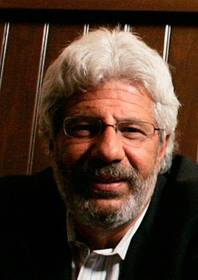
Billy Vassiliadis
Billy Vassiliadis, a Democratic lobbyist and close adviser to Reid, said Reid has the ability to “juggle more balls in the air at once than anyone else.” Typically, people are good at being focused on details or looking at the bigger picture. Reid does both.
“He’s involved in 50 or 100 things at once, but he never loses sight of his objective,” Vassiliadis said.
What follows are several examples of Reid’s political skill, or instances in which people were left wondering if Reid had been involved.
•••
From financial watchdog to ethically challenged and back
Georgiou had been a top adviser to a California governor, prosecuted Enron executives and was a key donor to Reid and other Senate Democrats. Reid established the self-made millionaire as a prominent national figure by appointing him to the Financial Crisis Inquiry Commission.
And when the panel released its report, Reid praised its findings.
But after he settled on Berkley as his candidate to run against Heller and Georgiou refused to step aside, the attitude of the Democratic establishment shifted.
Reid said privately that he felt betrayed by Georgiou.
Publicly, he voiced concern about Georgiou’s business debt and his actions during the financial crisis. The majority leader expressed regret over appointing him to the commission, casting a shadow over the work of the body that had been praised.
The AFL-CIO rallied against a company where Georgiou was a board member — it outsourced jobs to China, the union said.
“Here’s a guy, I didn’t know he lost a number of House races in California,” Reid told reporters in Washington. “He boasted about all of these jobs he was creating; all the jobs are in China. He didn’t bother to tell me about all the lawsuits that have been filed against him. He didn’t bother to tell me about all the liens on properties that he had.
“So yeah,” Reid finished, “I wish I hadn’t done it.”
Georgiou attributed Reid’s 180-degree turn to his Senate candidacy. He vowed to stay in, but had a change of heart this month. Georgiou wanted to focus on his private-sector businesses, he said in a statement.
(He did not return a call for comment for this story.)
Just as quickly as Reid had soured on Georgiou, he warmed to him again. Concern about his ethics and business dealings vanished. Georgiou was invited to introduce a panel discussion Tuesday at Reid’s National Clean Energy Summit.
“While Byron and I have had our differences in the past, I’m heartened by his decision today. His is an important voice and perspective on the causes of the financial crisis,” Reid said in a statement.
Reid said he is “confident that Byron will continue to contribute to Nevada and America in the years to come.”
Just not by running against one of Reid’s candidates.
•••
Sandoval to federal bench
Years before he was governor, Brian Sandoval was a rising Republican star. He headed the 2004 Bush-Cheney campaign in Nevada and landed a prime-time speaking slot at the Republican National Convention.
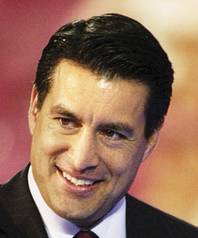
Brian Sandoval
Sandoval was also seen as the biggest threat to Reid’s re-election in 2010. With the cooperation of Reid’s friend Republican Sen. John Ensign, Sandoval was nominated in 2004 for a lifetime appointment to the federal bench, a perfect landing spot for a potential rival.
Four years earlier, Sandoval had declined an offer from Reid to join the federal bench. This time he accepted.
Sandoval left the federal bench in 2009 to launch a successful run for governor — against Reid’s son, former Clark County Commissioner Rory Reid.
•••
Sharron Angle and Sue Lowden’s chickens
Reid and his advisers knew his 2010 re-election campaign would be his toughest yet. As Senate majority leader, Reid had become a more divisive figure back home and a top target for conservatives.
To win, Reid’s team and the formidable Democratic machine he had built over a decade would need to run a flawless campaign and, perhaps most important, they would need a flawed opponent to run against.
The race would not be a referendum on Reid, his senior advisers insisted. It would be a choice between two candidates. One lawmaker in spring 2009 received a call from a Reid adviser: No matter what, the legislator was told, you have to pass legislation moving the primary from August 2010 to June. That, the lawmaker inferred, would give Reid more time to pummel his opponent, whoever it might be.
The Democratic Party that Reid had built — his efforts were boosted significantly by establishing Nevada as an early presidential caucus state — started taking out potential Republican opponents, from Rep. Jon Porter to state Sens. Joe Heck and Bob Beers. Rep. Dean Heller passed on running after several conversations with Reid.
Sue Lowden, a former state senator and wife of a casino executive, emerged as the pick of the anti-Reid GOP establishment. Lowden wasn’t a perfect candidate. But the Reid camp preferred to face either Danny Tarkanian or Sharron Angle over Lowden, who had personal wealth she could use to fund her campaign.
Leno on Lowden
Enter the Democratic Party “tracker,” a young person with a video camera, who caught Lowden telling a Mesquite crowd that people used to barter for health care coverage. After the clip was leaked to the media, Lowden — to the delight of Camp Reid — doubled down on her remarks in a subsequent television interview, invoking people bringing a chicken to the doctor.
Jay Leno used it in his monologue and a national joke was born.
Patriot Majority Political Action Committee, a group run by a former Reid staffer and funded with money from labor unions and pro-Reid casinos, bought hundreds of thousands of dollars of airtime to run ads highlighting Lowden’s statement.
Lowden plummeted in the polls. Angle rose. And Reid got the opponent he wanted.
•••
Courting Dawn Gibbons
Time and again, Reid faced lesser challengers as he ran for re-election. In 2004, it was social conservative Richard Ziser.
His opponent that year could have been Rep. Jim Gibbons, R-Nev., a star in Nevada Republican politics who had spearheaded a popular anti-tax initiative and almost automatically won re-election in his district.
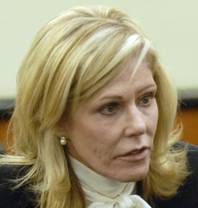
Dawn Gibbons
National Republicans were dreaming of taking out both top Senate Democrats, Tom Daschle and Reid.
The National Senate Republican Committee urged Gibbons to run against Reid, said Robert Uithoven, his former chief of staff. He was “their top recruit,” he said. “Reid wasn’t going to influence that so he went to a person much closer than NRSC, which was Dawn.”
Dawn Gibbons, then an assemblywoman and wife of Gibbons, was in regular contact with Reid and his wife. The couples had been friendly for years.
When it came time for Jim Gibbons to decide whether to challenge Reid, Uithoven said that Dawn Gibbons was against it.
“I think (Reid) was letting Dawn Gibbons know how much he valued their friendship,” Uithoven said.
In an interview, Dawn Gibbons said Jim Gibbons wanted to run for U.S. Senate. She said she and political adviser Jim Denton told him that he needed more money to seek higher office, and that didn’t appear likely given the staffing of the national Republican Senate campaign operation.
(Dawn Gibbons and Jim Denton would later become Republicans for Reid during his 2010 re-election campaign.)
Instead of challenging Reid in 2004, Gibbons ran the “Education First Initiative,” with support from Reid and some of his political donors. The initiative, which required lawmakers to pass an education spending plan before all other budgets, was added to the Constitution after gaining voter approval in 2004 and 2006.
It “gave Gibbons a nice platform to run on for governor,” one political observer noted.
•••
The unprovables
Among the potential Reid rivals that have fallen by the wayside are some who believe Reid had a hand in their demise. Often their theories are impossible to prove and won’t be confirmed until or unless Reid writes a tell-all memoir.
One lobbyist said, “The thing that makes him great is that everybody guesses about what he actually does.”
When the publisher and editor of the Las Vegas Review-Journal were replaced following Reid’s 2010 victory, some asked whether Reid’s public feud with the newspaper played a role in that.
Lt. Gov. Brian Krolicki, another potential Republican challenger in 2010, saw his prospects fizzle when, in December 2008, he was indicted by a grand jury for spending money from a college savings fund without prior authorization. Krolicki accused Attorney General Catherine Cortez Masto, a Democrat, of political motivations. A few weeks before, after all, he had announced he was running against Reid.
The case was later dismissed by a judge.
Was Reid involved? Cortez Masto has always said no. Her office would never, she said, move forward with an indictment for political reasons.
Vassiliadis called such speculation “silly.”
“He’s an easy one to blame for everything. It’s almost like the Red Scare — ‘Reid did it. Reid did it. Reid did it.’ Sometimes it’s absurd.
“But in politics, that’s what fuels cocktail parties, and late nights at Adele’s,” the Carson City restaurant where the political class frequently gathers.
He confirmed that Reid hangs up the phone suddenly when he’s done with a conversation.
“He’s not a chatterer,” Vassiliadis said. “He doesn’t have much time or energy for the sort of social niceties. He’s not one of best cocktail party guys you’ve ever seen.”
Instead, Vassiliadis said, Reid is focused on the next task at hand.
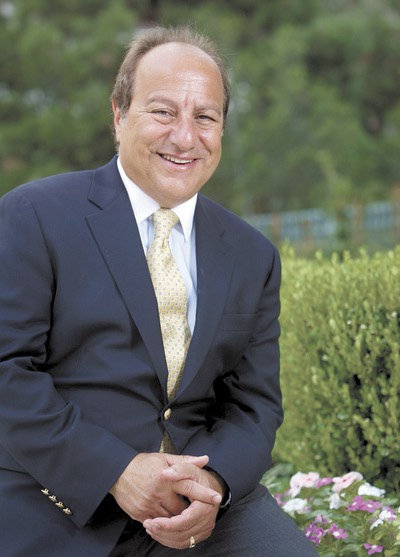

Join the Discussion:
Check this out for a full explanation of our conversion to the LiveFyre commenting system and instructions on how to sign up for an account.
Full comments policy